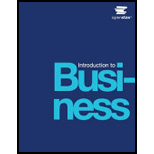
Introduction to Business
OER 2018 Edition
ISBN: 9781947172548
Author: OpenStax
Publisher: OpenStax College
expand_more
expand_more
format_list_bulleted
Textbook Question
Chapter 6.1, Problem 3CC
What is the difference between efficiency and effectiveness?
Expert Solution & Answer
Want to see the full answer?
Check out a sample textbook solution
Students have asked these similar questions
Answer this
How much is hunts owner equity?
help this answer accounting
Chapter 6 Solutions
Introduction to Business
Ch. 6.1 - Define the term management.Ch. 6.1 - What are the four key functions of managers?Ch. 6.1 - What is the difference between efficiency and...Ch. 6.2 - What is the purpose of planning, and what is...Ch. 6.2 - Identify the unique characteristics of each type...Ch. 6.3 - Explain the managerial function of organizing.Ch. 6.3 - What is the managerial pyramid?Ch. 6.4 - How do leaders influence other people's behavior?Ch. 6.4 - How can managers empower employees?Ch. 6.4 - What is corporate culture?
Ch. 6.5 - Describe the control process.Ch. 6.5 - Why is the control process important to the...Ch. 6.6 - What are the three types of managerial roles?Ch. 6.6 - Give examples of things managers might do when...Ch. 6.6 - List the five steps in the decision-making...Ch. 6.7 - Define the basic managerial skills.Ch. 6.7 - How important is each of these skill sets at the...Ch. 6.8 - How can information technology aid in...Ch. 6.8 - What are three principles of managing...Ch. 6.8 - Describe several guidelines for crisis management.Ch. 6 - Are top executives paid too much? A study of CEO...Ch. 6 - What type of manager is T.K. Kurien? How would you...Ch. 6 - What managerial role does T.K. Kurien assume in...Ch. 6 - What management skill sets does he exhibit?
Additional Business Textbook Solutions
Find more solutions based on key concepts
Create an Excel spreadsheet on your own that can make combination forecasts for Problem 18. Create a combinatio...
Operations Management: Processes and Supply Chains (12th Edition) (What's New in Operations Management)
What is an action plan? Why are action plans such an important part of market planning? Why is it so important ...
MARKETING:REAL PEOPLE,REAL CHOICES
Horizontal analysis(Learning Objective 2)15-20 min. What were the dollar and percentage changes in Fesslers Fin...
Financial Accounting, Student Value Edition (5th Edition)
1-13. Identify a product, either a good or a service, that will take advantage of this opportunity. Although yo...
Business Essentials (12th Edition) (What's New in Intro to Business)
E2-13 Identifying increases and decreases in accounts and normal balances
Learning Objective 2
Insert the mis...
Horngren's Accounting (12th Edition)
Knowledge Booster
Similar questions
- I need correct solutionarrow_forwardNonearrow_forwardAnnika Corporation sells products A, B, and C. Annika sells four units of A for each unit of C, and three units of B for each unit of A. The contribution margins are $1.20 per unit of A, $1.80 per unit of B, and $3.50 per unit of C. Fixed costs are $750,000. How many units of A would Annika Corporation sell at the breakeven point? [Financial Accounting]arrow_forward
- Answer? ? Financial accounting questionarrow_forwardGet correct solution this financial accounting questionarrow_forwardA company desires a net income of $950,000 when it has $2,800,000 of fixed costs and variable costs of 65% of sales. What are the required sales? a. $3,500,624.27 b. $8,200,570.89 c. $10,714,285.71 d. $12,000,057.54arrow_forward
- Need answerarrow_forwardA company desires a net income of $950,000 when it has $2,800,000 of fixed costs and variable costs of 65% of sales. What are the required sales? a. $3,500,624.27 b. $8,200,570.89 c. $10,714,285.71 d. $12,000,057.54 MCQarrow_forwardhello tutor provide solve accountingarrow_forward
arrow_back_ios
SEE MORE QUESTIONS
arrow_forward_ios
Recommended textbooks for you
 Contemporary MarketingMarketingISBN:9780357033777Author:Louis E. Boone, David L. KurtzPublisher:Cengage Learning
Contemporary MarketingMarketingISBN:9780357033777Author:Louis E. Boone, David L. KurtzPublisher:Cengage Learning Foundations of Business (MindTap Course List)MarketingISBN:9781337386920Author:William M. Pride, Robert J. Hughes, Jack R. KapoorPublisher:Cengage Learning
Foundations of Business (MindTap Course List)MarketingISBN:9781337386920Author:William M. Pride, Robert J. Hughes, Jack R. KapoorPublisher:Cengage Learning Foundations of Business - Standalone book (MindTa...MarketingISBN:9781285193946Author:William M. Pride, Robert J. Hughes, Jack R. KapoorPublisher:Cengage Learning
Foundations of Business - Standalone book (MindTa...MarketingISBN:9781285193946Author:William M. Pride, Robert J. Hughes, Jack R. KapoorPublisher:Cengage Learning Understanding Management (MindTap Course List)ManagementISBN:9781305502215Author:Richard L. Daft, Dorothy MarcicPublisher:Cengage Learning
Understanding Management (MindTap Course List)ManagementISBN:9781305502215Author:Richard L. Daft, Dorothy MarcicPublisher:Cengage Learning Purchasing and Supply Chain ManagementOperations ManagementISBN:9781285869681Author:Robert M. Monczka, Robert B. Handfield, Larry C. Giunipero, James L. PattersonPublisher:Cengage Learning
Purchasing and Supply Chain ManagementOperations ManagementISBN:9781285869681Author:Robert M. Monczka, Robert B. Handfield, Larry C. Giunipero, James L. PattersonPublisher:Cengage Learning


Contemporary Marketing
Marketing
ISBN:9780357033777
Author:Louis E. Boone, David L. Kurtz
Publisher:Cengage Learning

Foundations of Business (MindTap Course List)
Marketing
ISBN:9781337386920
Author:William M. Pride, Robert J. Hughes, Jack R. Kapoor
Publisher:Cengage Learning

Foundations of Business - Standalone book (MindTa...
Marketing
ISBN:9781285193946
Author:William M. Pride, Robert J. Hughes, Jack R. Kapoor
Publisher:Cengage Learning

Understanding Management (MindTap Course List)
Management
ISBN:9781305502215
Author:Richard L. Daft, Dorothy Marcic
Publisher:Cengage Learning

Purchasing and Supply Chain Management
Operations Management
ISBN:9781285869681
Author:Robert M. Monczka, Robert B. Handfield, Larry C. Giunipero, James L. Patterson
Publisher:Cengage Learning